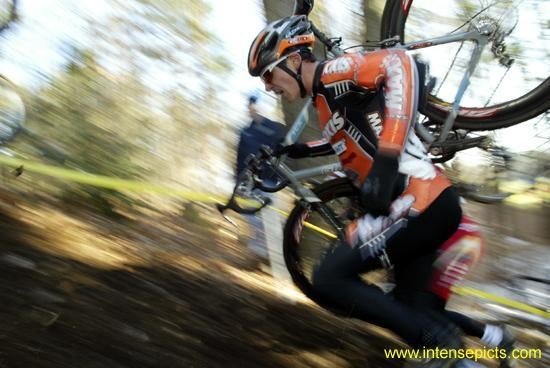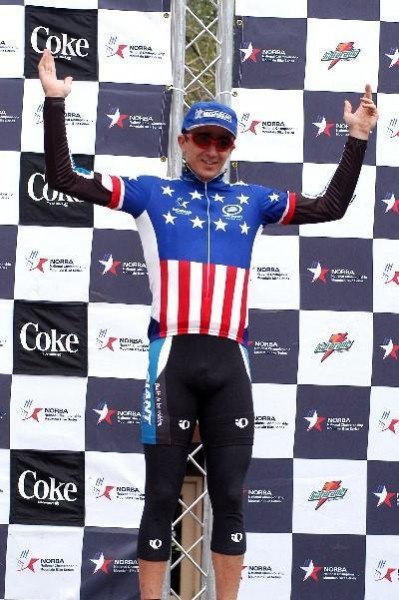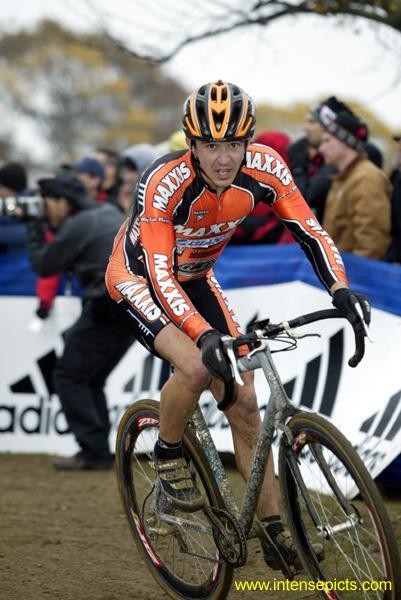Student of the sport
Midway through this week, before the USGP of 'cross stop in Bridgetown, New Jersey, we caught up...



An interview with Adam Craig, November 21, 2004
Midway through this week, before the USGP of 'cross stop in Bridgetown, New Jersey, we caught up with the precociously talented 24-year old mountain biker and cyclocrosser, Adam Craig. With cyclocross nationals and an adventurous winter vacation occupying his mind, Cyclingnews' Steve Medcroft got hold of him just before he was about to head out for a run...
Life is good for Adam Craig (Maxxis/Giant). His talent and run of good luck has earned him national championship jerseys every year since his first season in 1998. In fact, he's earned six in all: two as an U23 in cyclocross, and three U23 and one junior NORBA title.
So it was a surprise to see him falter in 2004, his first year in the elite field, a year where he was both contesting a chance to race for his country in the Olympics and when he was trying to make a name for himself in what is now his chosen profession. He says he suffered from "pretty amusing bad luck," and had to take the first half of the year with hubris.
As soon as the pressure of gunning for the Athens start line passed, Craig has come on strong. His fitness peaked. He became a fixture at the front of races. And he's currently ploughing his way into contention on the U.S Gran Prix of Cyclocross.
Learning to win
Cyclingnews: How much running are you doing now?
Get The Leadout Newsletter
The latest race content, interviews, features, reviews and expert buying guides, direct to your inbox!
Adam Craig: Not a whole lot. But I get dropped in 'cross races when we go up run-ups and its really annoying so I'm trying to run a day or two a week. Do some hills. Sprints. Tonight, I'm going to run stairs at the stadium; work on my uphill technique.
CN: You made a comment after a recent race that you owed second place to a clever brake-check by Mark McCormack, you said it was a good lesson. You've been riding for years, are you still learning from guys like Mark?
AC: Yes. That technique was good. He slowed me up perfectly; put me off my rhythm right before the sprint started, because why wouldn't you slow somebody up and put them off their rhythm right before the sprint started? There are still plenty of things I can learn. I'm still young. I'm just now getting to the point where I can ride at the front of races and be a factor. There are plenty of lessons along those lines I still need to learn - about positioning, what to do and when to do it.
CN: You've been at the front of races all of your career but you hint that being at the front now, in the elite filed, is different somehow.
AC: I've only been at the front of elite races this year. I've been there in U-23 'cross races and stuff like that but those were usually simple; races where the strongest man rides in the front and wins. But this year, mixed into a front group of guys, any of who could have their best day, I'm having to learn how to win races.
I don't mean to belittle my success in junior and U23 racing, but you can attribute those national championships to having solid seasons and showing up for most of the races. It's not like you have to go out and win races all the time - other than the two 'cross titles where I had to win outright, of course. This has been my first year in the elite class so it's been good that I'm already factoring into the races. I'm happy about the way things are going, especially in the mountain bike races. I've been on the podium a bunch and battling things out at the front has been fun.
Learning to get respect from the ladies
CN: I see that you spent time with the Devo development team. Is that where you got your start in racing?
AC: I'm from Maine. I started racing locally - actually racing downhill quite a bit. Just screwing around and being a kid. I ended up at Mount Snow in 1998, got second place in the junior race and made the world's team for cross country. I was seventeen. That got the ball rolling.
CN: So you were not yet a senior in high school. Did you have a high school team at all or was this something unique that you did?
AC: (Laughs) Everybody else definitely did other stuff and I was the only bike rider in school.
CN: Did being a mountain biking stud help your social life at all??
AC: Well, the guys thought I was some kind of a... It was all good. I didn't get much respect from the ladies either.
CN: Racing on a world stage while still new to the sport must have been an experience.
AC: Yeah, it was cool. World's was in Mont St. Anne Quebec, so it was only about four hours from my house. I had a blast. I rode with Devo after that. Devo is such a comfortable development program. You can have a good time, get some support and succeed. Nobody puts any pressure on you. You just enjoy yourself and race. And sometimes you do well and sometimes you don't. You take things as they come and no one comes down on you.
CN: How did you end up in Colorado Springs?
AC: I got selected for the Olympic Training Center resident athlete program for mountain bikers in '99 and 2000 - after the World's in Sweden. That opportunity got me two full years of focused bike racing straight out of high school which was good because it got me to realize that racing was an option for me as a career. The national team coach at that time was Stefan Gerard.
CN: You won the 2001 collegiate national championship. When did you make the transition to college?
AC: I went to the University of Maine - my one year of going to school. The training center thing ended and I figured I had better go to school, learn a few things and set my options up for the future. But then I had a good season that year, which was strange because I totally took it easy in the spring. I had an awesome summer with a good race at World's and a couple of top tens at NORBAs. That caught the eye of the Giant team director and I got the chance to come on board.
CN: You raced a couple of years as U23. U23s were mixed in with the elite racers. How were you faring in the general pack?
AC: Not too bad. I had a couple of top tens, like I said. But those were the days when Roland [Green] and those guys were racing so even in eighth place, you were still nine minutes off Roland and by yourself or battling with Tinker or someone. It felt good to be up there racing, but it's not the same as winning. I knew I still had work to do.
Learning about the five-ringed circus
CN: Through '03 and into '04, how real was the chance that you might make the Olympic selection?
AC: Very real. Just from the trajectory I was on and what I knew I was capable of, I was sure I could make the Olympic team. But from February to the last selection race in Calgary, things did not go my way.
I got pretty amused with the situation after a while. I'm pretty easy going - I don't waste energy stressing over stuff - but one thing after another went against me. Pretty amusing bad luck. And some bad physical stuff too, like getting tendonitis in the winter and missing huge blocks of training. I had mechanical problems piled up on top of that. I kept getting sick at weird times too. I don't know, it was pretty funny, the way things piled up. As soon as all the Olympic stuff was over, I had a spectacular season, the best year of my life for sure. I took a big, big step forward. And besides, I almost made the Olympic team.
CN: Does coming that close to being selected put Beijing [site of the 2008 Olympic Games] into some kind of perspective for you?
AC: Oh God yes. Beijing is front and center. I don't have too many goals on the way there - I'm tired of having goals since they haven't really worked out for me in a while - because when I don't have an objective, things seem to work out for me quite well. So going vaguely, Beijing is the focus. And what happens along the way is probably going to be good.
CN: Besides mountain biking, you also race cyclocross is a pursuit. Has that always been something you did?
AC: When I went to college I started doing it just because I was hanging out in Maine and it was the thing to do. I ended up winning nationals and going to World's so now 'cross is now definitely something I'd like to pursue more and more. In fact, I'd like to get the chance to race 'cross in Europe next year.
Learning to turn a page
CN: Before that happens, there's a cyclocross national championship race in Portland in December. How do you feel that race is shaping up?
AC: It's all of us against Jonathan Page.
CN: He is named by most of the field as the man to beat. Why? Is he that much more dominant?
AC: We'll see. We've all gotten better this year and have been racing hard against each other so I don't know. We'll see if we're on that level. It will be an interesting race. I'm hoping to win. It will be interesting to see if he's strong enough to ride off the front and stay there like he did last year. If that happens in this race again, I hope I'm the one out front. But we'll see. Jonathan is a nice guy. He deserves to win the race if he's prepared well.
CN: Do you have other cycling goals? Do you ever plan to race on the road?
AC: I actually got a call from a Division 3 road team manager yesterday asking if I was interested in some part-time racing with them. Although it has to fit into my mountain bike season, I'm going to see where that opportunity takes me. It could lead to doing some cool races like Georgia. If I do it, it will be something new to learn. I'm not used to road racing tactics; a bunch of people looking at each other trying to figure what's going to happen. I'm used to the gun going off and just racing all-out. It would be good for me to learn, but I'm not really pursuing it aggressively.
CN: Speaking of learning, how much help is it racing alongside someone as seasoned and professional as Geoff Kabush?
AC: I learn so much from Geoff, who's not only an elite-level guy who has his stuff together, but a super-nice guy who's totally down with me asking him how he does things. I ask and he says, 'This is how I do it and this is why', rather than wondering if he's telling me something that will make me faster than him some day. It's good to learn from people like that and I appreciate any lesson I can take. I always try to learn. It's a process.
CN: After nationals, do you go into hibernation for a while?
AC: I'm going into deep hibernation. I'll be in Maine until Christmas then I'll be striking off with my skis, a kayak and maybe the singlespeed for Bend, Oregon, stopping wherever it's snowing a lot. I've missed skiing. I ski-raced all through high school. It was a big part of my life that I've put way on the back burner for the last four or five years. I'm excited to get the chance to ski hard for a month before getting back on the bike to train for next season.
Learning how to build a season
CN: Has Giant renewed your contract for next year?
AC: To be determined. There are four options for me right now and Giant is one of those options. More than likely, I'll be living under a more privateer arrangement with Giant, where they kick us some cash and frames and we figure out the rest as we go. It will end up being a good situation regardless of what comes out of it.
CN: For 2005, your focus is mountain biking?
AC: For sure. Well, I don't know. For 2005, I plan to roll slowly into the mountain bike season and build form throughout the summer. I want to keep gas in the tank so I can race the full domestic cyclocross season in fall. Then I'd like to go to Europe for Christmas racing and stay for World's, to learn about European 'cross - to see if I can do well, to see if it's an option or a direction for me.
CN: Why the emphasis on cyclocross? What do you love about it?
AC: It's fast and interesting. There are a lot of different facets to it. Most of all, it's exciting racing. I'm finally getting strong enough and I'm learning enough about racing to know how to play it - to know when it's a good time to sprint out of the turns and when to put my head down and go fast. So why not? 'Cross is fun.
Other Talking Cycling Interviews